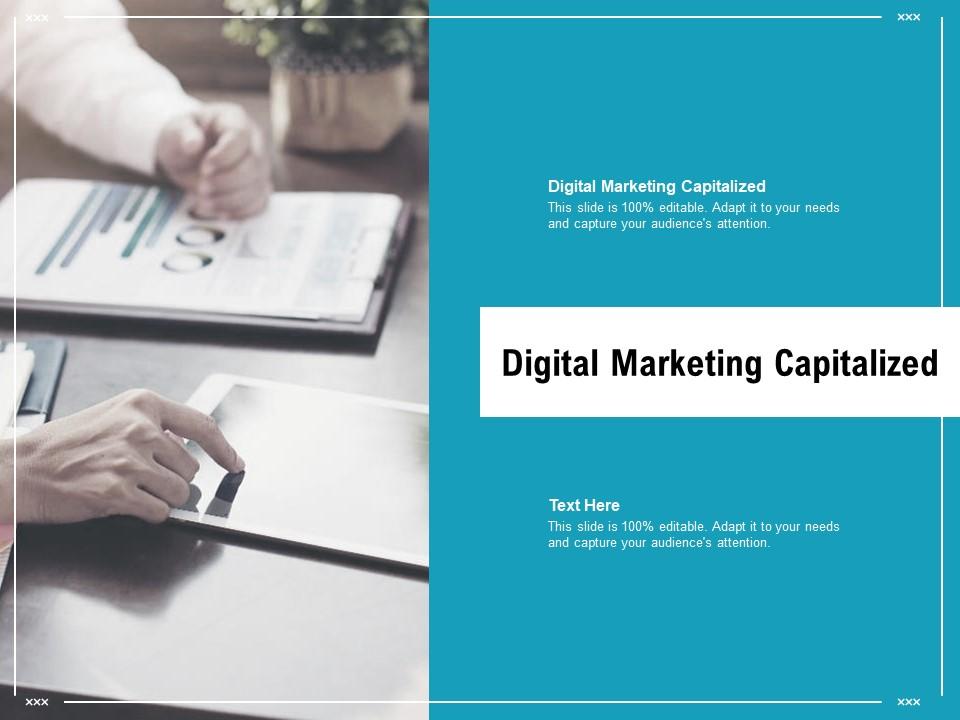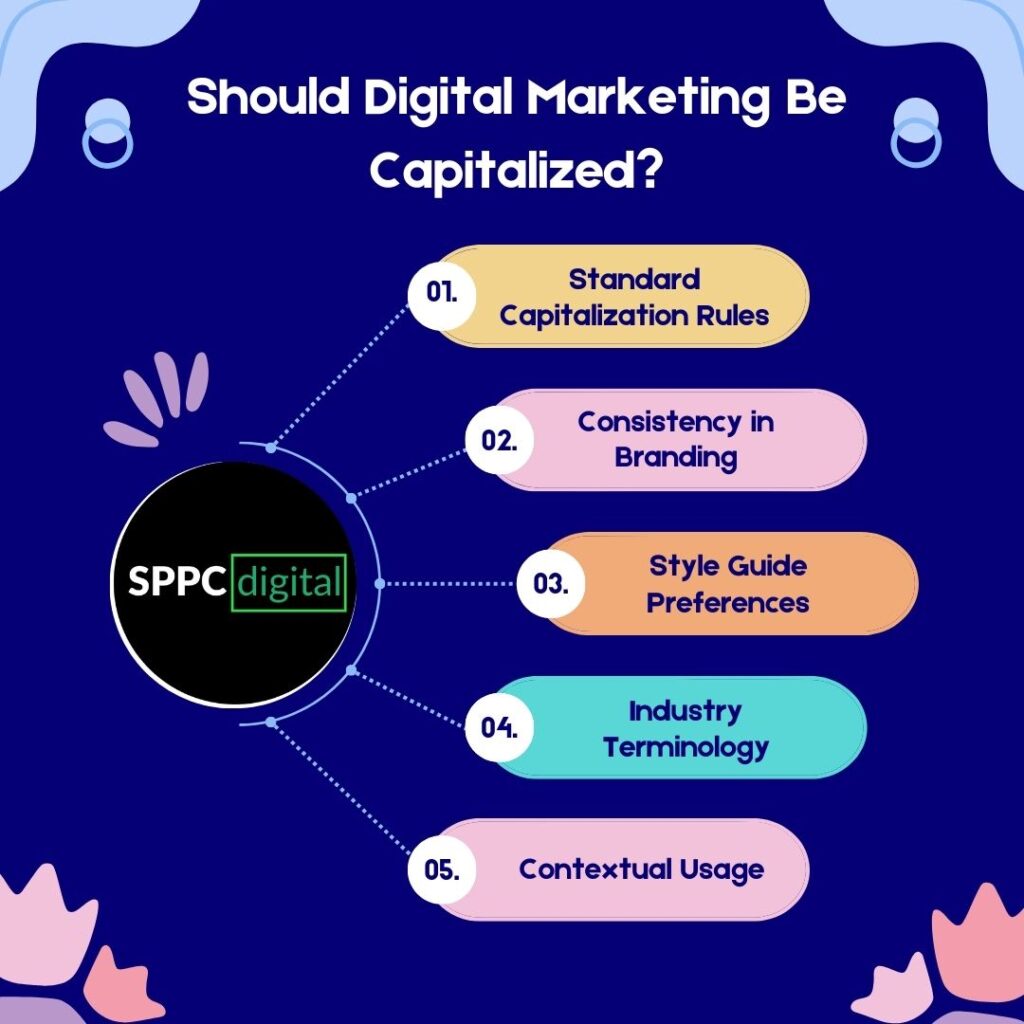Digital marketing should not be capitalized unless it begins a sentence or forms part of a title. The term is a common noun, not a proper noun.
should digital marketing be capitalized? Digital marketing has become a cornerstone of modern business strategies. Navigating the online landscape requires a keen understanding of how to effectively promote products and services. This form of marketing encompasses various tactics such as search engine optimization, social media engagement, and email campaigns.
Companies need to establish a strong digital presence to reach their target audience. With the rise of internet usage, the importance of digital marketing continues to grow, making it a key focus for businesses seeking to enhance their market position and drive growth. Successful digital strategies improve visibility, boost brand awareness, and increase customer engagement.
The Debate On Digital Marketing Expenditure
In the world of business, strategic investments are crucial for growth. Digital marketing is often at the heart of these strategies. Yet, how companies approach the costs of digital marketing—whether to capitalize or expense them—sparks ongoing debates. Let’s dive deep into this financial dilemma.
Capitalization Criteria
Capitalizing costs in business means recognizing an expense as an asset. It’s an essential part of accounting for long-term investments. For digital marketing costs to be capitalized, they must follow specific criteria:
- Create future economic benefits that a company expects to realize over several years.
- Are not for promotional activities that plan to stimulate sales immediately.
- Can be measured reliably, ensuring that the costs are accurate and traceable.
Digital marketing strategies like developing a custom piece of software for marketing purposes may qualify for capitalization.
Expensing In Financial Reporting
On the other hand, expensing digital marketing means recognizing the costs immediately in the income statement. Unlike capitalizing, expensing is for short-term impacts. The general rule for digital marketing costs:
- If an activity aims to generate immediate sales, it should be expensed.
- Day-to-day operational costs such as pay-per-click advertising campaigns are typically expensed.
Therefore, many digital marketing expenses fall under the umbrella of ‘selling, general & administrative’ (SG&A) expenses within financial statements.
Understanding whether to capitalize or to expense digital marketing costs can have significant tax and reporting implications. Strategic decision-making, adhering to accounting principles, and aligning with corporate goals are foundational to determining the best approach.
Digital Marketing Assets
Digital marketing assets are vital for modern businesses. They boost your online presence. They help make sales. They connect you to customers. Every company has these assets. They range from websites to social media accounts. Knowing how to manage them is key.
Defining Intangible Assets
Intangible assets are not physical. They are valuable. They are things like brand recognition and domain names. They are key parts of digital marketing. You cannot touch them, but they have value. Companies must understand them well.
- Brand names can draw customers.
- Trademarks protect your brand.
- The software helps run your marketing.
Website Costs And Capitalization
Websites are important assets. Building a site costs money. There is design, development, and content creation. Should these costs be capitalized? The answer is not simple.
| Expense | Capitalization |
|---|---|
| Domain Name | Yes, it’s an asset. |
| Web Design | Consider the long-term use. |
| Content Creation | Usually expensed but can be capitalized if it provides future benefits. |
Accounting rules can vary. It’s best to consult with a professional. They can tell what to capitalize. They can explain tax implications. They help you plan better.
Accounting Standards For Marketing Costs
Delving into the realm of marketing costs, an essential question arises: Should these expenditures be capitalized? Capitalization of marketing expenses piques the interest of accountants. It intertwines accounting principles with digital marketing strategies. This section explores the regulations and guidelines framing this intriguing debate.
Gaap Guidelines
The Generally Accepted Accounting Principles, or GAAP, set a framework for handling marketing costs. GAAP suggests that costs directly related to creating revenue can be capitalized. We can list several points under GAAP regarding when and how to treat marketing costs:
- Immediate advertising expenses are commonly expensed.
- Direct-response advertising may be capitalized.
- The useful life of the marketing asset influences capitalization.
It is crucial to note that capitalizing on marketing costs is uncommon. It’s reserved for specific scenarios, like a direct-response advertising campaign with a probable and measurable future revenue stream.
| Expense Type | Treatment under GAAP |
|---|---|
| General Advertising | Expenses in the current period |
| Direct-Response Advertising | Potential to capitalize |
Irs Regulations On Capitalization
The Internal Revenue Service (IRS) also weighs in on this topic. Their rules often align with GAAP but can differ. The IRS states that businesses must capitalize on certain costs that produce future benefits. For marketing expenses, the distinction isn’t always straightforward.
- Creation costs for advertising materials may need capitalizing.
- Media buys or advertising placements are typically expensed.
With the IRS, the emphasis is on sustaining or increasing business presence. Expenses strictly for promotion are usually expensed. Those with clear future advantages pose a case for capitalization. It’s advisable to consult a tax professional to navigate IRS rules.

Credit: www.slideteam.net
Capitalized Vs. Expensed: A Comparison
In the world of digital marketing, financial decisions play a pivotal role. Understanding the difference between capitalizing and expensing can shape the financial health of a business. This comparison will delve into the nuances of each approach and their distinct impacts.
Impact On Profitability
Capitalizing digital marketing costs means classifying them as an investment. This action reflects these costs as assets on the balance sheet. It spreads the expense over its useful life.
Expensing costs involves recording them as a cost of doing business in the period they occur. This approach affects the profit and loss statement immediately.
- Profit margins improve when expenses spread out over time.
- Short-term profitability decreases with immediate expensing.
- Capitalizing leads to smoothed expenses over several periods.
Tax Implications
Choosing to capitalize or expense affects a company’s tax liability. These decisions should align with tax regulations to optimize benefits.
| Method | Tax Benefit Timing | Impact on Taxable Income |
|---|---|---|
| Capitalizing | Long-term | Deferred tax expenses |
| Expensing | Immediate | Reduced current taxable income |
It’s crucial to consult a tax professional to understand these implications fully.
Strategic Considerations For Businesses
When diving into the digital market, businesses must craft a savvy strategy. Smart planning for your online presence isn’t just a luxury—it’s a necessity for staying relevant. Every move in digital marketing should align with the company’s broader goals. It’s not just about the short game, but also setting the stage for future success.
Budgeting For Digital Advertising
Effective financial allocation is the backbone of any digital campaign. Deciding on a budget for digital advertising can seem daunting. Yet, it’s critical for business growth. A well-planned budget secures resources for necessary platforms. It balances the cost with the potential reach and customer conversion rates. A company should consider:
- Ad costs on different platforms
- Target audience and their online habits
- Return on investment (ROI) for each campaign
Long-term Vs. Short-term Perspectives
Digital marketing strategies often focus on immediate results. Yet, long-term perspectives are essential for sustained growth. Brand building takes time and consistency. Short-term tactics are vital for quick wins. These can include sales promotions or trending content. But a balance with long-term plans is crucial. These involve:
- Content strategy that evolves with your audience’s needs
- SEO tactics to secure lasting search engine ranking
- Customer loyalty programs to ensure repeat business
Equal attention to immediate and future goals aids in thriving amidst digital evolution.

Credit: www.webdesignbooth.com
Case Studies: Capitalizing Digital Marketing
Exploring the real-world implications of digital marketing investments, we dive into a series of case studies. These narratives shed light on the strategies businesses employ and the outcomes they achieve. Effective capitalization on digital marketing can propel a brand to new heights. Yet, missteps offer equally valuable lessons. Join us as we delve into Case Studies: Capitalizing Digital Marketing.
Success Stories
Digital marketing powers business growth. Below are some triumphs:
- Brand A saw a 50% traffic spike after SEO optimization.
- Company B boosted sales by 30% with data-driven email campaigns.
- Enterprise C achieved a 25% conversion increase through social media ads.
Each success underscores smart investment’s power in digital marketing.
The Pitfalls Encountered
However, not all efforts yield positive results. Consider these examples:
| Brand | Strategy Used | Outcome |
|---|---|---|
| Firm X | Unfocused content marketing | Lost rankings |
| Business Y | Over-investment in paid ads | Diminished ROI |
| Startup Z | Ignoring mobile optimization | Decreased user engagement |
These stories highlight the need for a strategic and balanced approach to digital marketing.
The Role Of Software In Digital Marketing
Digital marketing thrives on innovative software solutions. Tracking trends, automation tools, and customer interaction platforms are examples of software driving digital marketing forward. Software helps marketers reach goals faster and more efficiently.
Software Development Costs
Building custom software can be costly. Yet, it may differentiate a business in a crowded market. Costs vary based on complexity and features needed. Businesses must consider these expenses:
- Design: Creative and UX design.
- Development: Coding and programming.
- Testing: Bugs and user testing.
- Maintenance: Updates and fixes.
Small businesses could opt for off-the-shelf software to cut costs. Weigh the benefits of custom versus generic solutions carefully.
Subscription Services And Saas
Subscription models offer cost-effective options. These are known as Software as a Service (SaaS). SaaS benefits include:
- Lower upfront costs: No need to purchase hardware.
- Scalability: Adjust subscriptions as needed.
- Up-to-date software: Automatic updates included.
- Accessibility: Access from any device with an internet connection.
Examples of popular SaaS in digital marketing include CRM platforms, analytics tools, and email marketing services. These tools provide data-driven insights and streamline operations, leading to better ROI.

Credit: www.businessofapps.com
Expert Opinions On Marketing Capitalization
Let’s plunge into a pool of expert opinions on a question puzzling many in the digital realm: should “Digital Marketing” be capitalized? The answer isn’t just a matter of preference; it’s influenced by recommendations and practices backed by industry specialists.
Accounting Professionals’ Insights
An array of accounting professionals weighs in on the subject of capitalizing “Digital Marketing”. Their views point towards the context of its use:
- Financial Documents: In balance sheets or official reports, “Digital Marketing” often appears capitalized for emphasis.
- Internal Communication: Memos and emails may see a relaxed approach, not requiring capitalization unless at the sentence start.
- Tax Purposes: When referenced in tax filings, consistency is key; choose a style and stick with it throughout the document.
Digital Marketers’ Viewpoints
From the marketing corner, digital marketers offer their stance:
| Context | Capitalization Norm |
|---|---|
| Brand Names | Capitalize, as it’s a proper noun |
| Job Titles | Capitalize in formal texts, lowercase in casual contexts |
| Services | Capitalize services as part of a package or offering |
| General Use | Usually lowercase unless at the start of a sentence or in a title |
Digital marketers often prioritize brand consistency across various platforms. They suggest aligning capitalization with the brand’s established style guide.
Future Trends In Marketing Expenses
Exploring the nuances of accounting practices, businesses grapple with whether to capitalize on digital marketing expenses. The evolving landscape of fiscal strategies in marketing compels a reevaluation of digital costs as potential investments.
Digital marketing is not just a buzzword anymore; it’s an essential part of business growth. Understanding how marketing expenses will shift with trends is critical. Let’s check out the trends shaping the future of these expenses.
Evolving Digital Landscapes
The digital world is ever-changing, and marketing tactics need to keep up. Businesses will see a rise in spending on digital advertising, SEO, and personalized content.
Investments in data analysis tools will increase.
- More budget allocation for mobile marketing
- Move towards interactive and immersive experiences like AR and VR
- Increased use of AI for customer insights
Predicting Changes In Accounting Practices
As the digital realm grows, so does the need to revisit accounting for marketing. Firms will likely adapt by capitalizing on certain digital marketing expenses.
This includes website development costs and software spending. These could be seen as long-term assets.
| Expense Type | Current Treatment | Future Prediction |
|---|---|---|
| Software Subscriptions | Operating Expenses | Capital Assets |
| SEO Campaigns | Operating Expenses | Capital Assets |
| Content Creation | Operating Expenses | Capital Assets |
With these trends, businesses must stay nimble and ready to adapt their accounting strategies.
Best Practices For Marketing Investment
In the world of digital marketing, making smart investments can make or break your success. Knowing where to allocate your budget and measuring the outcomes are crucial steps. Focus on practices that deliver tangible results. Leverage analytical tools. Set clear objectives. Ensure compliance and proper record-keeping. These actions define the roadmap to impactful digital marketing investments. Ready to optimize your marketing funds? Let’s explore the pivotal strategies.
Analyzing Return On Investment
Measuring your ROI tells if your marketing efforts pay off. It’s essential to tie every dollar to specific goals. Clear KPIs help in understanding the effectiveness. Use tools like Google Analytics to track performance.
- Revenue Growth: Compare sales before and after campaigns.
- Customer Acquisition Cost: Calculate spending to gain one customer.
- Lifetime Value: Measure long-term revenue from each customer.
Employ these metrics to assess and refine your strategy constantly.
Record-keeping And Compliance
Organized records support strategic decisions and ensure compliance with regulations. Digital marketing requires adherence to data protection laws. GDPR and CCPA are key examples. Store documents and data securely. Make transparency a priority.
| Document Type | Details to Record | Purpose |
|---|---|---|
| Financials | Payments, Budgets, Revenue | Budget Management |
| Campaign Data | Clicks, Conversions, Interactions | Performance Analysis |
| Compliance Forms | Privacy Policies, Data Usage | Legal Compliance |
Create checklists and use audit trails to verify compliance regularly. This safeguards your company and builds customer trust.
Frequently Asked Questions Of Should Digital Marketing Be Capitalized?
Is Digital Marketer Capitalized?
No, the term “digital marketer” is generally not capitalized. It’s a common noun, not a proper noun unless it starts a sentence or forms part of a title.
Do I Capitalize Marketing In A Sentence?
No, do not capitalize “marketing” unless it begins a sentence or is part of a proper noun.
Is Marketing Capitalized Or Small?
In general writing, the word “marketing” is not capitalized unless it starts a sentence or is part of a title.
Can You Capitalize Marketing Costs?
Marketing costs are generally not capitalized; they are expensed as incurred. Only in rare circumstances, where marketing costs are directly linked to creating assets with future benefits, may capitalization be justified. Always follow the applicable accounting standards.
Conclusion
Understanding the correct capitalization of ‘digital marketing’ indeed matters for professionals maintaining industry standards. It’s clear that consistency is key in written communication. Remember, capitalizing job titles is unnecessary unless at the start of sentences or part of official names.
Adopting this approach can reflect well on your attention to detail and professionalism. Embrace these nuances to enhance your digital marketing efficacy.



